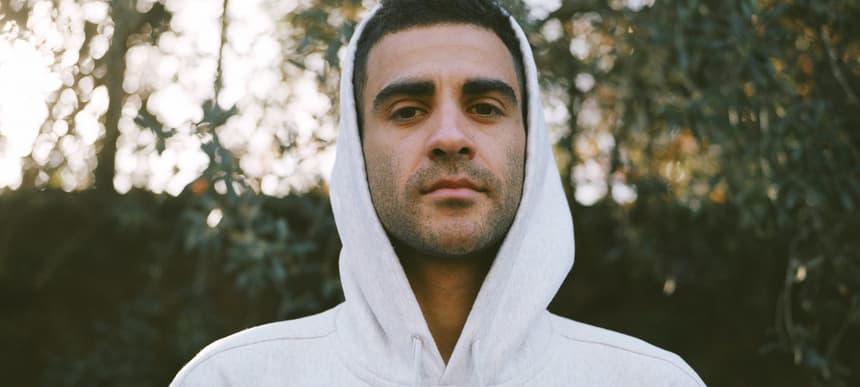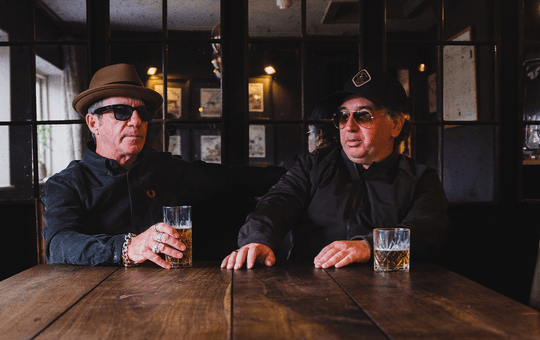
'Cut Short' author Ciaran Thapar on youth violence, austerity and drill
Ciaran Thapar is a youth worker, social activist, and writer, whose work centres around youth violence, austerity politics, British multiculturalism, and contemporary music culture. He just released his first book ‘Cut Short’ and its tale follows the stories of four central characters (Tony, Carl, Jhemar and Demetri) who act as case studies of a larger exploration into a social demographic that Ciaran has a deep understanding of.
It was through being a mentor, that Ciaran met the young men behind the names Carl, Jhemar and Demetri, each of whom posed different requirements. But the book is also about music – the book’s twelve chapter titles reference tracks and lyrics by Nas, Burial (Ghost Dog: The Way of the Samurai), Skengdo & AM, Skepta, Digga D & Sav’o, 2pac and more. Music is deeply ingrained into the pages of the book; Ciaran also uses the phrase ‘inner city pressure’ – connecting him to Goldie and Dan Hancox (whose book is called ‘Inner City Pressure’), and at the same time, joining the dots between jungle, grime and drill, all of which have been demonised by some parts of the media in recent years.
Following its release, Dummy catches up with the author of ‘Cut Short’ to discuss its impact, its creation, and its future.
The book has been out a few weeks now. How has it landed?
I am pleased with it. Every single day something new happens and I get a new sense of perspective on what the book means and what the grand scheme of things is. I would say there’s been an impact (it’s easy especially when you’re a music writer) to treat the release of something like the release of an album. But it just doesn’t work like that. An album comes out and you consume it in a day. Whereas with a book it takes weeks, months, even years to get onto people’s radar, so I’ve learnt that the book coming out was just the first step of a long journey ahead. The impact for me thus far, in terms of the most special thing, are some of the more personal messages I’m receiving from people who are involved in the creation of the book, like relatives of some of the characters. When it’s stuff like that, it has such value to those people and that to me is the foundation of what’s important.
How have some of the people in the book reacted to ‘Cut Short’?
It varies massively. For some people just seeing their name on paper and being able to go into a bookshop and see their name with their story has been significant. I can honestly say there has been an exclusively positive, celebratory, proud response from anyone that I’ve interacted with who feature in the book’s pages. I guess it’s probably the four main characters, Tony, Carl, Jhemar, Demetri – who all have their different relationship with the book and with me that is particularly special because they’ve put a lot of time and effort into it. Jhemal has had some of his most vulnerable thoughts put on the page. Their responses and my interactions have brought us all closer and made us feel like we have a voice with a big impact, so it’s all been really positive thankfully.
What was the process for documenting their individual stories in the way that you did?
I basically just talked to be true. I had written pieces of journalism with their voices in it before. My mentoring of them was so long term, and with Jhemar, almost familial, because of what happened to his brother. We had become very, very close, so the trust was there. With Carl, or the young man that inspired the character of Carl, I didn’t plan that – I was in a process of planning the book whilst I was also helping him as a youth worker and it just sort of came together because throughout our conversations he started to show an interest in the book and I thought it would be powerful to introduce his story in it if he wanted to.
How do we encourage people to accept help who might be less willing? Was Carl more challenging to mentor?
It was more challenging to mentor him in that his life was more extreme, so there were more things at stake. Also, it was a different relationship; Jhemar and Demetri had been at risk of things but there was no explicit danger for them in the same way as Carl. Jhemal losing Michael was a very different period, which could have gone pear shaped, as we talk about in the book, but with Carl I literally felt like every time I saw him was a blessing because I thought he might not be alive, or he might be in hospital next time I checked on him. I kind of expressed this in the book but maybe don’t go too deep into it out of respect.
I literally felt like every time I saw him was a blessing because I thought he might not be alive, or he might be in hospital next time I checked on him.
In answer to your question, the only way that a young man like that can get out of their situation is by having all those adults to just be there – to chat to and to support and to help with their CV and help debrief things. It’s about building relationships early, that’s the key thing. If you can build relationships with an eleven or twelve-year-old, by the time they get to when they’re sixteen/seventeen, you’re probably at the stage where you can influence their decision making more easily. But if you leave it too late or you don’t provide a service or you don’t build those relationships early it’s very difficult.
What stops other people working in voluntary positions in places like South London where gentrification is happening?
I’d say probably two things. One of them is time. People are busy, and they’re distracted with their own lives. We live in a society where (especially in London where there is the most pronounced version of this) there’s an overwhelming set of incentives to just look after yourself. People are trying to hustle, people are trying to pay their rent, people have their own lives and to thrive in a city like this where there are constantly distractions and incentives to just keep going, going, going, going, and spending money.
The second thing is that I think people are fearful. I suppose what I learnt is that I’m proud that I did because it resulted in all of this. But it was a lot of chance and coincidence, it wasn’t totally planned; another person did take me under his wing, but I think that you have to drop your defences – that fear is just a construct, it’s just in your head. A lot of people are afraid to break through that and drop your defences. A lot of people have asked me what they can do to help, and I’m like ‘well you can just go on google and find out for yourself’ – that’s all I did.
Is there anyone who you would really like your writing to reach that you think it might not have reached so far?
I guess you could say some senior member of the government – to read with it and connect with it, but I’m beyond believing that they’re ever going to be on my side. I’d say maybe one specific person is Sadiq Kahn and I’m not saying he’s a perfect person I’m just saying he’s in a position to influence stuff. He’s the mayor of London and, although he’s not got all these things right, he’s in a position to take on board what I’ve written about. Basically, I feel like if he read it, he would connect with it, and be able to elevate the voices in it and the things I try and champion.
That’s on a politics/influencer level but I’m just really keen for young people to engage with it. That’s what I’m trying to set up over the coming months. There’s nothing I’d rather do than speak to young people about the book and have them read parts of it and connect with it and feel represented in it. That’s important to me because I think, I hope – the big vision is to create a big generational shift, which if enough people read the book in the younger generation, it’ll spark lots of ideas– career paths, university choices, efforts in the community, all of that sort of stuff.
I wish this book could be placed in the library at my school where there are young people from a different background, in one sense, to the young people in your book – to create some crossover between people who are detached from one another.
I’m glad you say that. This is exactly what I’m planning now – now the text is written and I’ve done all the main promotional stuff, it’s about how I can get the book into the right hands, and how it can connect with young people physically or digitally. There’s lots of different ideas I’ve got. One of the big plans I’m working on is to create educational resources that can go in the book with the aim of eventually getting it on the curriculum or… As the book shows, I can walk into any classroom and engage with young people, so if I could combine that skill with the fact that I’d written this book and upskill other teachers and youth workers to do the same thing… How can I empower people to get what’s in the book distributed, even if it’s just a paragraph that you analyse or you chat about.
Do do you have any support from Penguin to do this?
I won’t be able to do it by myself. I could easily contact a bunch of youth clubs and do stuff like that on a smaller scale but Penguin will get behind it – they might not know it yet, but they’ll get behind it – the team at Penguin have been amazing. I’m chatting with them about it – my vision is to do some sort of youth club tour and go across the UK. I’m committed to doing something relatively radical where I do fifty events over two years or something – where I get to go to every part of the country and see what it’s like as a young person there and connect. That’s what I’d like to do so it’s looking quite big, it’s going take a while to plan.
I’m committed to doing something relatively radical.
How can long form journalism vs. sensationalism be used as a useful tool in tackling some of the topics that you discuss?
That’s a good question that I haven’t been asked yet. There’s lots more GQ writing to come. People are impatient, and with all the incentives on social media with clickbait – I hate it. I’d say that there’s an indirect lineage between that as a culture and people on the ground suffering. The information and stories we tell ourselves that are going round are predominantly led by very shallow headlines that misrepresent things and we’re not able to understand, care or digest these issues at all. Therefore, we’re not able to vote in the right way and we’re not able to treat people on the street in the right way. If members of the public that don’t have access to diverse communities are constantly told stories about teenage black boy in hoodies committing crime – it conditions those members of the public to stereotype that whole demographic. It has real repercussions.
Members of the public that don’t have access to diverse communities are constantly told stories about teenage black boy in hoodies committing crime.
That’s what I’m trying to do with ‘Cut Short’ or more so generally. Whenever I’ve written about this subject, I’ve turned down so many writing opportunities that are 600 or 800 words. They often get chopped up and led by the headlines, and people don’t even read them. If less people read the long form, I’m not that bothered as long as they connect with it properly. With the book, I’d like to think that over time, over the next few years – the good stories take a long time – the stories that stay with society and enter the fabric of what people are talking about are not going to be the short pieces, they’re going to be the long-form pieces. Regardless of long form as proper storytelling and skill, I think it’s especially important now that society is so polarised and obsessed with short term things.
In the book you talk about Headie One’s first album…
No one’s really written about the music, and I’ve had my mouth deliberately zipped because I’m waiting for people to ask me about it. I’ve got the headspace now to start writing about it. I’m sure you would have picked up that the book is packed with, full of musical references. Honestly there are lots of obvious ones but there are so many subtleties that are included in there as little treasure hunts for people who are paying attention, I’m keen to answer questions on it.
When drill is commercialised, what is the impact on the people who it originated from in the UK – do you think there’s a danger of it going too far and not representing its roots?
Separate to Dave, because I don’t think this applied to him, I wrote and interviewed about drill over three years. There are so many formative interviews with a rawness and purity. Even if it was unlistenable to most of the population, there was something that was very, very true about it that spoke to social reality. It was like a survival. ‘Cut Short’ tries to highlight this; I try and present the social reality that the music comes out of and so I guess I came to believe that it was very important in what it was telling us about the experience of young people. Clearly, it’s a good thing that there’s been a number one that’s a drill song but it’s not really the same. It does a lot of good for the genre and it does a lot of good because it pushes through and allows people to make money but I’m still writing reports for court cases where they’re using drill lyrics to convict young men. So just because it’s a number one, it’s almost like a distraction because there’s more draconian things being pushed through anyway. It’s a bit of a paradox – there’s one side of it which is really positive and shows its matured and developed and commercialised, which means more people are making money and that’s worth celebrating – I’ve continually done that in my writing. But I just think that the way the original form of the music was devalued, is still there – that dark draconian element.
We’re really not past what happened in the headlines a few years ago are we…
No not at all, I feel like in ten years’ time we’re going to study this. My access to this subject is so unique that I do feel certainly for music historians this is going to be a text book that says ‘this was crazy’. All these headlines were commenting on this thing, and then this actual reality taking place was being completely ignored and no one was questioning decisions being made – no one was questioning all of these different things that I present in ‘Cut Short’ as being a problem. That exists before the music exists, so I am quite cynical – I’m hopeful but also cynical because the London music scene has more of a global presence than it has ever done. If you told 13/14-year-old Ciaran when I was getting into grime and I was into garage when I just thought, ‘aw everyone laughs at this stuff and Americans think we’re stupid and that kind of stuff’, now there’s a sense of pride that teenagers can have over their music, but the problems are just deeper and deeper. I really am seeing the depths of them and its really dark. People, real people, young people who are just trying to survive are basically forced into awful situations through no real choice of their own, like Carl. All these court cases that I’m residing over are just other cases of Carl – on paper its just Carl again and again and again but they haven’t had the support that he had so it’s dark.
Can you expand on your role writing these court case reports?
I basically help the defence create a more unbiased presentation of evidence. The solicitors who represent the client will contact me to help them make a case for the fact that their music lyrics and videos shouldn’t be included as formal evidence to convict them of whatever crime. It’s not to prove their innocence, it’s to set a precedent that their music lyrics, not in every case but almost in every case, are irrelevant to what’s happening. The police are using, shoehorning, all these bits of music culture into it when it shouldn’t have anything to do with it.
What’s also really bad about it is one of the cruxes of the argument I make. In some circumstances, it seems fair if you can prove a young person who has committed this crime, is also the person that’s rapping lyrics about the crime and how they love doing it – it seems quite logical. So I’m not going to sit here and say naively that you shouldn’t take that into account. But what I think is really problematic, is that they don’t present another side to it. There’s no acknowledgement that this music is made for a reason, it isn’t just being made to create more violence. They’re making this music to try and leave the violence behind and spend more time in the studio. They’re investing money in the studio to make this music; writing these lyrics on their phone – often very traumatic things that they don’t have the space to talk about with any adult. So, I’m trying to present this other side where you can take this negative stuff and present the other side. It ends up creating a distortion effect – if you’re a judge and you’re just sat there without knowing anything about this music then you’re not going to question anything unless you’re told otherwise, so I’m trying provide that other lens.
I was interested in your involvement with music charities…
Thousands of charities who are ultimately trying to help people are falling through the cracks. Unfortunately, we live in a society where charities are so undervalued but play such a vital role in the youth services. In ‘Cut Short’ this extends out to public services in general. Over the last forty years there’s been a devaluation taking place, and in my impression, the post-Thatcher years are the most pronounced version of that. After the war there were decades of appreciation for the public services. But since then, the squeezing of austerity has made it harder while also meaning that public services have a bigger and bigger role to play. Places like art charities, food banks, youth services and loads of different places, are essential because the government aren’t doing it and they’re not going do it. Unless something drastically changes, there are these insanely detached people making decisions that are half the time just about getting votes and half the time about fulfilling some weird sort of egotistical fantasy about power. None of it is to do with making change for young people or people that are vulnerable. That’s a long answer to say that charities are very important and are increasingly important. It’s not often people get an account of what a charity programme looks like inside but in ‘Cut Short’ I’ve tried to show the nuts and bolts of these.
What will replace drill?
Something’s definitely going to replace it. I don’t know what it’s going to be, and I don’t think it’s going to happen yet, but I think there’s going to be a post-pandemic world where a new genre dominates, and I think it’s going to be even more digitally leveraged, more about videos and about video trends because of Tik Tok.
There’s going to be a lot of dark music coming out of London and the UK because of the state of a lot of young people’s lives.
The optimist in me says, I hope that the predominant music type is one that helps us through the recovery of the pandemic. I still think that there’s going to be a lot of dark music coming out of London and the UK because of the state of a lot of young people’s lives. I do think that with the infrastructure that’s being built over the last five years and that were built over the last fifteen/twenty years in terms of digitally, with money flowing around, that there’s a capacity for a bit more celebration and a bit more of a vibe rather than having to create super underground dark music like drill was at the start.
The internet is everything now. We are living in the matrix.
The internet is everything now. We are living in the matrix. Anything that happens from now on is either a result of, or a reaction to the internet. All of the things that made drill what it is, happened five years ago, and a lot has changed in five years. People’s reliance on the internet is so much more now and the pandemic has accelerated that.
Are the chapter names a representation of London in some way?
Each chapter name has a whole story specific to that chapter. They’re track names and lyrics. If you spent a bit of time on Google it wouldn’t be too hard to figure them out. There’s a couple that are obscure, but you’d still find them.
What album currently represents your values and everything you demonstrate in ‘Cut Short’?
The obvious choice is Dave’s album. I don’t think there’s a better answer to that. I suppose I’ve got the right to say that because I was chatting to him about it and the energy behind it is, if you can make a number one album talking about all of the things he talks about with that level of intelligence, it means that you’re really connecting with a serious number of people. No insignificant amount of British society is consuming his story, that’s deep! I think it would be easy for me say a more underground album or mixtape, but I think that there is something to be said about Dave’s success and the balancing act of creating mainstream music while being authentic and speaking to real issues while educating people about his perspective.
Buy ‘Cut Short’ here.













